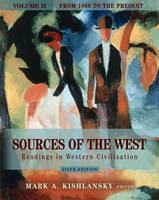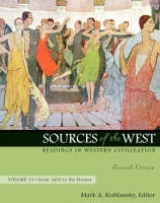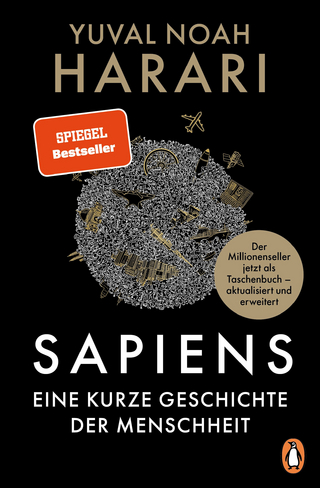
Sources of the West
Pearson (Verlag)
978-0-321-24342-3 (ISBN)
- Titel erscheint in neuer Auflage
- Artikel merken
Sources of the West presents a well-balanced selection of readings that integrate coverage of social, economic, religious, and cultural history within a traditional, political framework.
The text includes constitutional documents, political theory, philosophy, imaginative literature, and social description that raise significant issues for classroom discussions or lectures. By reading the voices of the past, students can connect them to the present; learn to understand and respect other cultures; and think critically about history.
*New sources are asterisked.
Preface.
How to Read a Document.
IV. THE ANCIENT RÉGIME.
The Wars of Religion.
72. Henry IV, The Edict of Nantes(1598).
73. Cardinal Richelieu, The Political Testament (1638).
74. Hans von Grimmelshausen, Simplicissimus (1669).
Subjects and Sovereigns.
75. James I, True Law of a Free Monarchy (1598).
76. Philippe Duplessis-Mornay, A Defense of Liberty Against Tyrants (1579).
77. Sir William Clarke, The Putney Debates (1647).
78. Thomas Hobbes, Leviathan (1651).
79. John Locke, The Second Treatise Concerning Government.
*80. Molière, The Would-Be Gentleman (1670)
81. Duc de Saint-Simon, Memoirs (1694-1723).
Science and Commerce.
82. Galileo Galilei, Letter to the Grand Duchess Christina (1615).
83. René Descartes, Discourse on Method (1637).
84. Thomas Mun, England 's Treasure by Foreign Trade (1664).
85. Adam Smith, The Wealth of Nations (1776).
Enlightened Monarchy.
86. Catherine the Great, Memoirs (ca. 1755).
87. Maria Theresa, Testament (1749-50).
88. Viscount Bolingbroke, The Idea of a Patriot King (1749).
The Enlightenment.
89. Voltaire, Candide (1759).
90. Jean-Jacques Rousseau, The Social Contract (1762).
91. Montesquieu, Spirit of the Laws (1748).
*92. James Cook, Journals (1769)
93. Joseph Crassons de Medeuil, Notes on the French Slave Trade (1784-1785)
94. Thomas Jefferson, The Declaration of Independence(1776).
95. Cesare Beccaria, On Crimes and Punishments (1764).
96. Marquis de Condorcet, The Progress of the Human Mind (1793).
The French Revolution.
97. Abbé de Sieyès, What Is the Third Estate? (1789).
98. The Declaration of the Rights of Man (1789); Olympe de Gouges, The Declaration of the Rights of Woman (1791).
99. Edmund Burke, Reflections on the Revolution in France (1790).
V. THE AGE OF REFORM.
Industrialization in Britain.
100. Arthur Young, Political Arithmetic (1774).
101. Samuel Smiles, Self-Help (1859).
102. Sir Edwin Chadwick, Inquiry into the Condition of the Poor (1842).
103. Friedrich Engels, The Condition of the Working Class in England (1845).
Nineteenth-Century Society and Culture.
104. Jane Austen, Pride and Prejudice (1813).
105. Henrietta-Lucy, Madame de la Tour du Pin, Memoirs (1820-43).
106. Alexis Soyer, Modern Housewife (1850); Mrs. Beeton's Book of Household Management (1861).
*107. Documents of the Irish Potato Famine (1844-45).
Political Critiques.
108. J. S. Mill, On Liberty(1859).
109. Pierre Proudhon, What Is Property? (1840)
110. The Great Charter (1842).
111. William II, Letter to the Shogun (1844); Bakufu, Reply to the Government of Holland (1845).
112. Karl Marx and Friedrich Engels, The Communist Manifesto (1848).
113. Alexander II and Prince Kropotkin, The Emancipation of the Serfs (1861).
114. Otto von Bismarck, Reflections and Reminiscences (1898) and Speech to the Reichstag (1879).
115. Pope Leo XIII, Rerum Novarum (The Condition of Labor) (1891).
Emancipating the Mind and the Body.
116. Charles Darwin, The Descent of Man (1871).
117. Friedrich Nietzsche, Beyond Good and Evil (1886).
118. Sigmund Freud, The Interpretation of Dreams (1899).
119. E. Sylvia Pankhurst, History of the Suffrage Movement (1912).
120. Beatrice Webb, Women and the Factory Acts (1896).
Thoughts on Empire.
121. J. A. Hobson, Imperialism (1902).
122. Cecil Rhodes, Confession of Faith (1877).
123. Carl Veltin, Social Life of the Swahilis.
124. Rudyard Kipling, “The White Man's Burden” (1899).
125. George Orwell, “Shooting an Elephant” (1936).
VI. TWENTIETH-CENTURY EUROPE.
War and Revolution.
126. Voices From the Battle of the Somme.
127. Ernst Jünger, Storm of Steel (1920).
128. Woodrow Wilson, The Fourteen Points (1918).
129. V. I. Lenin, What Is to Be Done? (1902).
The Second World War.
130. J. M. Keynes, The Economic Consequences of the Peace (1919).
131. Winifred Holtby, Women and a Changing Civilization (1934).
132. Benito Mussolini, Fascist Doctrine (1932).
133. Adolf Hitler, Mein Kampf (1923).
134. Memories of the Holocaust (1938-45).
135. Winston Churchill, Speeches (1940).
136. Adolf Eichmann, Testimony (1961).
The Twentieth-Century Imagination.
137. Virginia Woolf, A Room of One's Own (1929).
138. Alexander Solzhenitsyn, One Day in the Life of Ivan Denisovich (1962).
139. Jean-Paul Sartre, Existentialism (1946).
140. Simone de Beauvoir, The Second Sex (1949).
The Transformation of Eastern Europe.
141. Winston Churchill, “The Iron Curtain” (1946).
142. Nikita Khrushchev, Report to the Communist Party Congress (1961).
143. Mikhail Gorbachev, Perestroika (1987).
144. Francis Fukuyama, The End of History? (1989).
Toward a New World.
145. Charter of the United Nations (1946).
146. The Charter of Economic Rights and Duties of States (1974).
147. Kofi Annan, Report on the Fall of Srebrenica (1999).
*148. Report of the September 11 Commission (2004).
Acknowledgments.
Photo Credits.
| Erscheint lt. Verlag | 22.4.2005 |
|---|---|
| Sprache | englisch |
| Maße | 187 x 235 mm |
| Gewicht | 603 g |
| Themenwelt | Geisteswissenschaften ► Geschichte ► Allgemeine Geschichte |
| ISBN-10 | 0-321-24342-0 / 0321243420 |
| ISBN-13 | 978-0-321-24342-3 / 9780321243423 |
| Zustand | Neuware |
| Haben Sie eine Frage zum Produkt? |
aus dem Bereich



